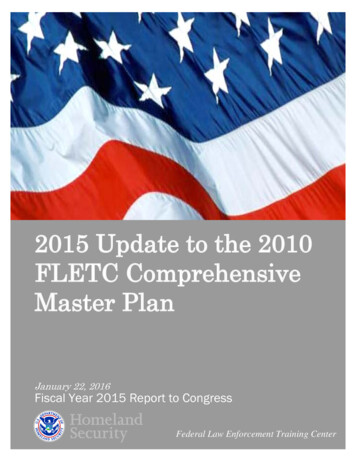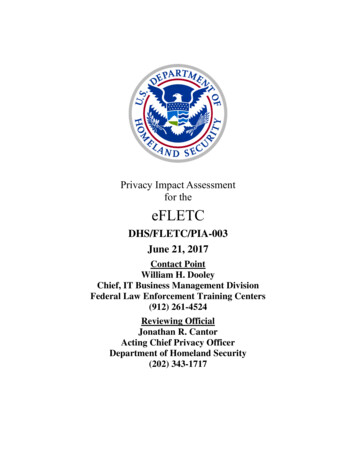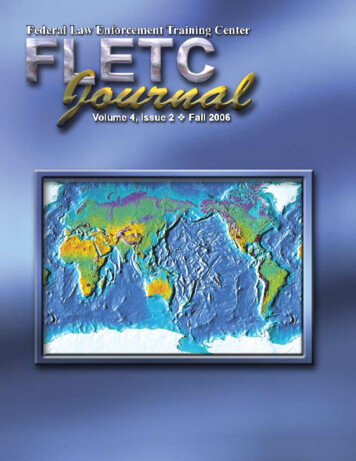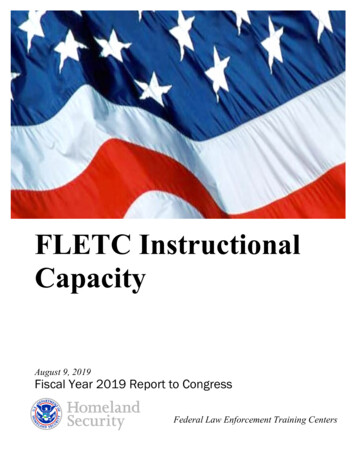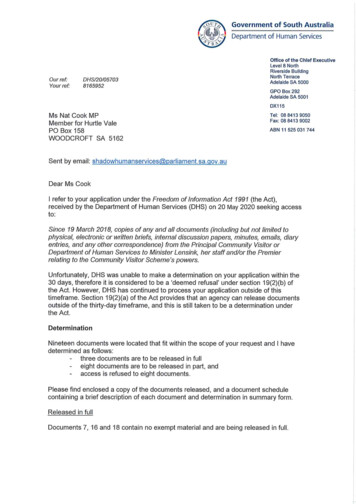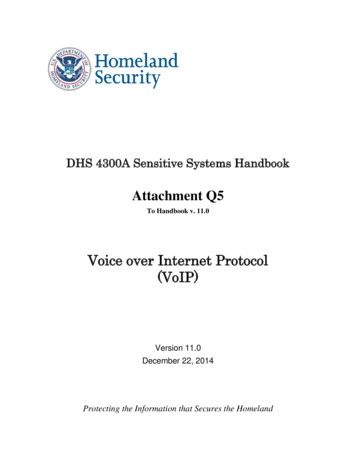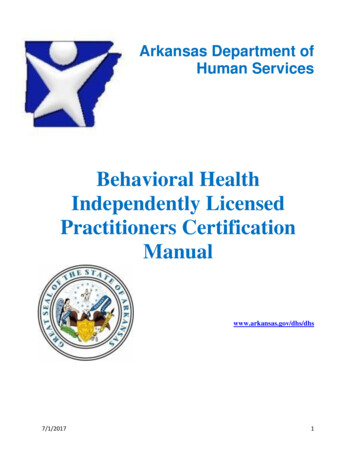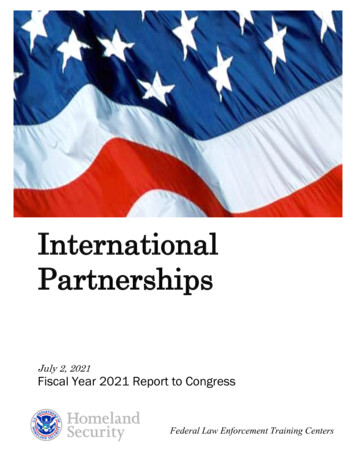
Transcription
InternationalPartnershipsJuly 2, 2021Fiscal Year 2021 Report to CongressFederal Law Enforcement Training Centers
Message from Director Thomas J. WaltersJuly 2, 2021I am pleased to present the following report, “International Partnerships,”prepared by the Federal Law Enforcement Training Centers (FLETC).This document has been compiled pursuant to language in House Report116-458, which accompanies the Fiscal Year (FY) 2021 Department ofHomeland Security (DHS) Appropriations Act (P.L. 116-260). Includedis an overview.Pursuant to congressional requirements, this report is being provided tothe following Members of Congress:The Honorable Lucille Roybal-AllardChairwoman, House Appropriations Subcommittee on Homeland SecurityThe Honorable Chuck FleischmannRanking Member, House Appropriations Subcommittee on Homeland SecurityThe Honorable Chris MurphyChair, Senate Appropriations Subcommittee on Homeland SecurityThe Honorable Shelley Moore CapitoRanking Member, Senate Appropriations Subcommittee on Homeland SecurityInquiries regarding this report may be directed to FLETC Senior Legislative Affairs AdvisorAnthony Acocella at Anthony.Acocella@fletc.dhs.gov or at (912) 230-0668.DirectorFederal Law Enforcement Training Centersi
Executive SummaryThe purpose of this report is to inform Congress about the status of FLETC’s internationalprograms, including the numbers of international students trained, countries of origin, programsadministered, and plans to expand existing partnerships, as required by House Report 116-458,which accompanies the FY 2021 DHS Appropriations Act (P.L. 116-260). This program reportdescribes training programs that were delivered last fiscal year and highlights key initiatives thatFLETC is engaging in to expand collaboration with foreign partners.FLETC supports international law enforcement capacity building by providing training for lawenforcement officers of foreign partners. FLETC continues to develop strategic partnerships tofacilitate this mission, such as with the DHS Security Sector Assistance initiative, theDepartment of State (DOS) International Law Enforcement Academies (ILEA), and theDepartment of Justice International Criminal Investigative Training Assistance Program.In FY 2020, FLETC delivered 17 law enforcement training programs through a variety ofplatforms, including in-person classroom, virtual, and blended-delivery formats. These programswere delivered at FLETC training delivery points, through bilateral export training, and at theILEAs. This multi-pronged training delivery allowed FLETC to train 304 international studentsfrom 59 countries on topics such as countering violent extremism, human trafficking awareness,law enforcement leadership, money laundering, and cyber financial crimes.In FY 2020, FLETC continued to expand its international footprint through several keyinitiatives, to include a reinvigorated partnership with the Government of India. In coordinationwith the DHS Office of Strategy, Policy, and Plans, FLETC and the Indian National PoliceAcademy are developing a joint memorandum of cooperation to enhance collaboration ontraining development and delivery. FLETC has partnered with DOS’s Bureau of InternationalNarcotics and Law Enforcement Affairs to develop the Law Enforcement AcademyDevelopment initiative, a unique whole-of-government approach to basic law enforcementcapacity development. Additionally, FLETC is working with U.S. Embassy partners andrelevant stakeholders on the Capabilities, Analysis, and Assessment Team, a comprehensivemechanism for evaluating foreign partner security gaps and needs. FLETC worked with DOS onan outreach project releasing a global communiqué to U.S. Missions abroad. The first of itskind, this communiqué shared FLETC’s matriculation and projection process. Through theseand other initiatives, FLETC will continue to support and expand its international reach.ii
International PartnershipsTable of ContentsI.Legislative Language .1II.Background .2Figure 1: Country Origins of Foreign Officers Trained.3III.International Training Details .4FY 2020 Training Programs – Course Details and Training Statistics .4IV. Advancing FLETC’s Strategic Goals Through Partnerships.10India – Memorandum of Cooperation (MOC) .10FLETC Support Programs .10FLETC Expanded Collaboration through DOS Communiqués.11FLETC Partnerships – DOJ/ICITAP .11V.Conclusion .12Appendix: Abbreviations .13iii
I.Legislative LanguageHouse Report 116-458, which accompanies the Fiscal Year (FY) 2021 Department of HomelandSecurity (DHS) Appropriations Act (P.L. 116-260), includes the following requirement.International Partnerships—The Committee supports international lawenforcement capacity building programs to develop new partnerships with othercountries that build shared values around the rule of law and good governance. TheCommittee encourages FLETC to expand its capacity to enroll and provide trainingfor law enforcement officers of foreign partners, especially as part of internationalcapacity building programs. The Committee directs FLETC to provide an annualreport to the Committee, beginning not later than 90 days after the date of enactmentof this Act, on the status of its international programs, including the number ofinternational students trained, their countries of origin, programs administered, andplans to expand existing partnerships and develop new ones.1
II. BackgroundThe Federal Law Enforcement Training Centers (FLETC) supports international lawenforcement capacity building through developing strategic partnerships and providing trainingfor law enforcement officers of foreign partners. FLETC is a service provider for the whole ofU.S. Government, to include federal, state, local and territorial agencies, as well as tribal andinternational organizations. FLETC’s authorizing statute (6 U.S. Code § 464, Federal LawEnforcement Training Centers) enables FLETC to deploy a multipronged approach tointernational training focused on:a) support for the DHS Security Sector Assistance (SSA) and international publicdiplomacy initiatives;b) support for the Department of State (DOS), International Law Enforcement Academy(ILEA) Program and the ILEAs located at Gaborone, Botswana; San Salvador, ElSalvador; Bangkok, Thailand; Budapest, Hungary; Accra, Ghana; and Roswell, NewMexico;c) support for the Department of Justice (DOJ), International Criminal InvestigativeTraining Assistance Program (ICITAP);d) targeted training and capacity building efforts that address privacy, civil rights, civilliberties, and the rule of law;e) hosting authorized and vetted international law enforcement officers/professionals fortraining at FLETC training delivery points nationwide; and,f) sharing of law enforcement training best practices.FLETC serves as America’s enterprise resource for federal law enforcement training to morethan 95 U.S. federal law enforcement participating organizations. Agencies such as U.S.Immigration and Customs Enforcement and the U.S. Coast Guard regularly leverage FLETCresources to engage with their foreign counterparts in support of their missions.FLETC partners with a variety of domestic and international organizations that support the U.S.National Strategy on SSA. FLETC partners with DOJ/ICITAP through a memorandum ofunderstanding (MOU) in direct support of the National Security Strategy. FLETC also partnerswith DOS’s Bureau of International Narcotics and Law Enforcement Affairs (INL) and theOffice of Knowledge Management in the delivery and management of training at the ILEAsworldwide.In FY 2020, FLETC provided training to 304 foreign officers from 59 countries, as shown inFigure 1.2
Figure 1: Country Origins of Foreign Officers TrainedCountry of OriginAngolaAustraliaBahamasBangladeshBermuda (British OverseasTerritory)BotswanaBrazilBurkina a RicaDemocratic Republic of theCongoDominican RepublicEgyptEl ng Kong (SpecialAdministrative Region of thePeople's Republic of ry of biaNew 545Republic of the CongoRomaniaRwandaSenegalSeychellesSierra 123965UgandaVietnamZambia215216134914171861077
III. International Training DetailsFor FY 2020, FLETC delivered law enforcement training courses through classroom, virtual, andblended-delivery formats at its four training delivery points, through bilateral exchanges and theILEAs. Because of the Coronavirus Disease 2019 (COVID-19) pandemic-related impacts ontraining, including international travel restrictions, FLETC engaged with 304 internationalstudents from 59 countries, compared to FY 2019 where FLETC trained 1,183 students from 87countries.FLETC delivered 17 law enforcement training programs to international students in FY 2020,covering topics such as counterterrorism, human trafficking, leadership, fraud, and more. TheFLETC training was coordinated through partnerships with DOS/INL and the U.S. Embassies.A brief synopsis of these programs is provided below.FY 2020 Training Programs – Course Details and Training StatisticsFLETC provides training at ILEAs and other locations in support of U.S. law enforcement,counterterrorism, and counterproliferation objectives using U.S. foreign assistance funding.Foreign assistance support includes funding from INL and other DOS funding mechanisms.Partner nations not eligible for U.S. foreign assistance also self-fund participation in FLETCdelivered training on a space-available, fully reimbursable basis. Advanced Interviewing for Law Enforcement Investigators Training Program wasdelivered in-residence at ILEA Gaborone. This program is designed to enhance theinterviewing skills of law enforcement officers. Participants learn essential techniques andskills to obtain information through interviews and interrogations to implement upon theirreturn to duty. Participants include criminal investigators, law enforcement officers, andcriminal justice officials who conduct interviews of victims, witnesses, and suspects.Participating countries: Uganda, Botswana, Ghana, Seychelles, Kenya, The Gambia,Tanzania, and Lesotho Countering Violent Extremism and Crisis Leadership was delivered in-person at ILEARoswell. This program is a part of a broader program called ILEA Roswell Executive Policyand Development Symposium on Transnational Organized Crime. This program is designedto develop a deeper knowledge of leadership principles and the issues of violent extremism.The program focuses on facilitated discussions on leadership, ethics, and organizationalchange principles, using simulation exercises focusing on strategic challenges. Participantsinclude senior level law enforcement and criminal justice professionals, federal judges,parliamentarians, and at least one senior level prosecutor from each country.Participating countries: Niger, Mauritania, Republic of the Congo, Democratic Republic ofthe Congo, Senegal, Kenya, Burkina Faso, Namibia, and Rwanda4
Cybersecurity Conference was delivered virtually. This program was designed to fostereducation and awareness of the current threats and innovations that may have an impact onhow law enforcement deals with cybercrime and technical investigations. Subject matterdiscussed included:oooooooData Acquisition: Drone Artifact Extraction;Internet-Based Investigations: How to Minimize Your Risk Online;Electronic Law and Evidence: Legal Issues and Digital Forensics;First Responders to Digital Evidence: Novel Devices Investigators;Introduction to Mobile Device Investigations: Cellphone Seizures;802.11 Tools for Analysis and Geo-Location: Home Networking; andInternet-Based Investigations: TOR (The Onion Router) and the Dark Web.Attendees had the opportunity to collaborate with subject matter experts from FLETC and itsparticipating organizations, as well as with technology vendors from across the industry.Participating countries: Peru, New Zealand, Bangladesh, and India Foreign Affairs Counter Threat was delivered in-person at FLETC’s Cheltenham,Maryland, training delivery point. This program is a DOS-required program designed toprovide a student-centered approach to security awareness and situational response training.The program provides classroom sessions and practical applications culminating in finalexercise scenarios. Participants include personnel and adult family members who live andwork overseas while serving under the DOS Chief of Mission authority. The training ismandatory for foreign deployment to most countries.Participating countries: Haiti, Kosovo, Uganda, Mozambique, Romania, Ghana, Nigeria, andAngola Human Trafficking and Child Exploitation was delivered in-person at ILEA Roswell.This program is part of a broader program called ILEA Roswell Executive Policy andDevelopment Symposium on Transnational Organized Crime. It was designed with a victimcentered approach to focus on building a comprehensive national response model forcombating trafficking in persons and online child exploitation. The program focuses on keyareas of policy and enforcement guidance, criminal justice, victim services, and engagementwith civil society. Participants included senior level law enforcement and criminal justiceprofessionals, federal judges, parliamentarians, and at least one senior level prosecutor fromeach country.Participating countries: Niger, Kenya, Mauritania, Burkina Faso, Republic of the Congo,Democratic Republic of the Congo, Senegal, Namibia, and Rwanda International Banking and Money Laundering Training Program was delivered inresidence at FLETC’s Glynco, Georgia, training delivery point. This program focuses oninternational money laundering and financial investigations. The program includes a briefdiscussion of money laundering and related laws, including the Bank Secrecy Act and the5
Money Laundering Control Act. It includes a discussion of the Financial CrimesEnforcement Network as a resource in international investigations. Common methods ofinternational money laundering are discussed. Traditional and nontraditional internationalbanking is discussed as it relates to facilitating the movement of proceeds of criminal activityand terrorist financing. The program is interspersed with relevant case studies and classactivities related to international money laundering and terrorist financing.Participating country: Canada Internet Investigations Training Program was delivered in-residence at FLETC’s Glynco,Georgia, training delivery point. This program is designed to provide investigators, analysts,and individuals serving as direct law enforcement support with a basic understanding of theskills needed to conduct Internet-based investigations. Students perform various practicalexercises to reinforce skills learned during the course. Participants include investigators,intelligence analysts, intelligence specialists, or individuals serving as direct law enforcementsupport personnel, from the federal, state and local law enforcement community, who aretasked with Internet-based investigations.Participating countries: Italy, Cameroon, and Brazil Introduction to Criminal Investigation Training Program was delivered in-residence atFLETC’s Glynco, Georgia, training delivery point. This program is designed to acquaint thenoncriminal investigator student with the procedures, techniques, legal concerns, andchallenges associated with a criminal investigation. It focuses on the role of the criminalinvestigator and emphasizes interviewing skills and legal requirements. Participants includenoncriminal investigator personnel and individuals serving as direct law enforcement supportpersonnel.Participating countries: Sierra Leone and Egypt Law Enforcement Fitness Coordinator Training Program was delivered in-residence atFLETC’s Glynco, Georgia, training delivery point. This program is designed to present thestudent with information concerning health and wellness, strength and conditioning, physicalfitness assessment, and testing protocol. It includes instruction in program design, basicanatomy, exercise physiology, exercise leadership, injury prevention, nutrition, and basicstrength movements. Participants include law enforcement training instructors.Participating country: The Bahamas Law Enforcement Leadership Development was delivered in-person at ILEA San Salvadorand ILEA Budapest. This program is an ILEA-specific program delivered jointly by multiplefederal law enforcement agencies in which FLETC conducts leadership training to includeleading change to respond effectively to the challenges of leading law enforcementorganizations in the 21st century. FLETC instructs in week one of the program, teachingstudents to recognize and utilize behavioral style characteristics, values, paradigms, andleadership flexibility models for strategically developing human resources. Participants6
include mid-level law enforcement officers, supervisory investigators, or other criminaljustice officials.Participating countries: Dominican Republic, Costa Rica, Peru, Guyana, Jamaica, ElSalvador, Haiti, Nigeria, Mauritania, and Mali Law Enforcement Supervisors Leadership Training Program was delivered in-residenceat FLETC’s Glynco, Georgia, training delivery point. This program is designed to broadenhuman capital management skills within the law enforcement mission and culture. It focuseson developmental skills through adult learning models that employ lecture, practicalexercises, case studies, and self-directed learning. Participants include sworn lawenforcement officers/agents or law enforcement support personnel employed by a federal,state, local, or tribal agency or department who have first-line supervisory responsibilities orwho are preparing for advancement to a supervisory position.Participating country: Australia Leadership for Women in Law Enforcement was delivered virtually to ILEA Bangkok andILEA Gaborone and in-residence at FLETC’s Glynco, Georgia, training delivery point. Theprogram lays the foundation for the development of female law enforcement leaders.Viewing law enforcement leadership from a female perspective, participants gain the abilityto apply skills essential to build credibility and to apply exemplary practices of highlyeffective leaders. Participants include mid-level law enforcement officers, nonsupervisoryinvestigators, and other criminal justice officials.Participating countries: Timor-Leste, Indonesia, Philippines, Malaysia, Hong Kong,Thailand, Cambodia, Burma, Indonesia, Republic of the Congo, Democratic Republic of theCongo, Lesotho, Guinea, Botswana, Comoros, Burkina Faso, Zambia, Togo, and Singapore Leadership in Crisis Training Program was delivered in-residence at FLETC’s Glynco,Georgia, training delivery point. This research-based program helps law enforcementofficers and emergency managers from federal, state, local, and tribal agencies to hone theleadership skills needed during a critical event. Because critical events can vary widely insize, scope, and impact, this program focuses on core concepts of communication,collaboration, critical thinking, and decision-making that are applicable in virtually anysituation. Using innovative technology, this program creates an immersive environment thatchallenges the participants’ ability to apply leadership, interpersonal, and decision-makingskills in a crisis situation.Participating country: El Salvador Mass Casualty Virtual Symposium was delivered virtually. The symposium was designedto develop prevention strategies and recommendations on improving the Nation’s ability toprevent multiple casualty acts of violence. Attendees developed partnerships and greaterinsights on the prevention of multiple casualty acts of violence. Participants includedFLETC and participating organization staff along with a cross-section of stakeholders from a7
variety of disciplines. The 2-day discussion involved overviews on pre-attack threatassessment investigations, case studies, leveraging social media platforms to identifypotential threats, and identifying physical security deficiencies and vulnerabilities.Additionally, the symposium covered post-attack response for managing and conducting highvolumes of interviews, tips and techniques for capturing and analyzing electronic evidence,and forensic investigations of a mass casualty event.Participating countries: Australia, Fiji, and Philippines Mentorship In-Service Training Support was delivered in-residence at FLETC’s Glynco,Georgia, training delivery point. This program provides instructor-level training immediatelyfollowed by one-on-one shadowing by the student of a FLETC instructor engaged in actualtraining operations. This program is a part of FLETC’s engagement with the Royal BahamasPolice Force (RBPF) on the Law Enforcement Academy Development (LEAD) Project. Inthis component of the LEAD program, RBPF instructors attend a specific training program atFLETC. After completing the FLETC training program, the RBPF instructors remain atFLETC for 1 week to be embedded with the respective FLETC training division to observeFLETC’s curriculum, instructional systems, and methodologies. FLETC subject matterexperts act as mentors for the RBPF instructors and continue to collaborate with them aftertheir return to the Police College, serving as a professional and technical resource to assistwith course development.Participating country: Bahamas Physical Security Training Program was delivered in-residence at FLETC’s Glynco,Georgia, training delivery point. This program provides a baseline knowledge of physicalsecurity systems and procedures as defined by the Interagency Security Committeeguidelines. Students participate in various physical security assessments, draft a writtenreport, and participate in various student-centered learning activities. Participants includefederal, state, local, or tribal law enforcement officers and agents who are assigned dutiesrelated to physical security protection.Participating countries: Vietnam and Bermuda Strategy and Cyber Financial Crimes was delivered in-person at ILEA Roswell. Thisprogram is a part of a broader program called ILEA Roswell Executive Policy andDevelopment Symposium on Transnational Organized Crime. It is designed to teachgovernment executives how to prepare high-quality, peer-reviewed proposals based onrelevant information and analysis for presentation and possible implementation. Thesymposium presents a logical framework for strategic planning and issue analysis usingcritical thinking and a formal analytic framework. It incorporates formal instruction onnational and international challenges and strategies for addressing them such as task forces,intelligence sharing, anti-corruption with a special emphasis on cybercurrency, cyberfinancial crimes, money laundering, and asset forfeiture. Participants develop anunderstanding of how to identify the context of various issues, develop a framework toanalyze the issues from all facets, and present their ideas to senior officials in their home8
countries. Additional topics of instruction include corruption, strategic planning, legaltheory, leadership, and organizational modeling. It culminates in a capstone project in whichthe students prepare executive level presentations to address issues through legislative,regulatory, or reorganizational proposals.Participating countries: Colombia, Panama, Honduras, and El Salvador9
IV. Advancing FLETC’s Strategic Goals ThroughPartnershipsIn FY 2020, FLETC supported several international training initiatives to develop and expandinternational partnerships that advance FLETC’s strategic goals. These include a reinvigoratedpartnership with the Government of India; the development of two unique support programs toassess partner training/capacity needs and to develop training academy skills; coordinated, globalcommuniqués to FLETC’s partners globally; and interagency partnerships in support of SSA.India – Memorandum of Cooperation (MOC) FLETC, through the DHS Office of Strategy, Policy and Plans, is coordinating with theNational Police Academy of India and U.S. Embassy stakeholders on a joint MOC. Throughcollaboration and stakeholder engagement, FLETC and the Indian National Police Academyidentified areas of mutual interest and are working to establish a bilateral dialogue throughthe pending MOC. This MOC is focused on law enforcement, criminal justice training, andinformation sharing. Currently in draft form, FLETC will explore partnership opportunitiesto share best practices in law enforcement training delivery and development of programs.Both parties are committed to establishing and maintaining a platform supporting discussionthat could provide opportunities for enhanced cooperation and collaboration in the future.FLETC Support Programs LEAD Project. In support of bilateral and multi-lateral law enforcement and criminaljustice training programs and academy capacity-building, FLETC engaged stakeholders toimplement capacity-building strategies through the LEAD program. This initiative willenable an international partner to increase new officer baseline skill levels by improvingbasic training academy instructional skills, techniques, and methodologies. As describedabove, FLETC is piloting the program with the RBPF through an interagency agreement withDOS/INL. FLETC has provided a variety of instructor development programs and plans toassist the RBPF in its development of training lesson plans. Capabilities, Analysis, and Assessment Team (CAAT). FLETC is developing the abilityto provide a whole-of-government approach to security assessments that can be employedglobally to meet U.S and foreign partner security objectives. The CAAT is designed toprovide program support and services that include front-end diagnostics; training,organizational, occupational, environmental, and root cause needs/factors enabling correctiveaction planning; new programming; and ongoing multi-level program evaluation. FLETC,working with U.S. Embassy partners and other stakeholders, will collaborate with foreignpartner police colleges or training academies to identify and recommend solutions for keycapability gaps. Ultimately, CAAT aims to implement a crossfunctional regimen to assess,monitor, evaluate, adapt, and strengthen existing programs and to identify new ones.10
FLETC Expanded Collaboration through DOS Communiqués In order to collaborate better with interagency partners worldwide, FLETC partnered withDOS in an outreach program through a series of diplomatic communiqués. Thiscommuniqué series is the first of its kind shared with all U.S. Missions abroad to informinteragency partners of FLETC’s matriculation and projection process. FLETC is workingwith interagency partners like DOS’s Diplomatic Security Service, whose Regional SecurityOfficers work with FLETC to make available appropriate and cutting-edge training. FLETCalso is exploring a partnership with DHS’s Office of Strategy, Policy, and Plans to embed theprinciples of global outreach in pre-deployment training of DHS staff. Through outreach,FLETC’s intent is to partner better with U.S. Missions abroad availing resources that DHSand interagency officers can leverage in support of the U.S. law enforcement internationalmission and priorities.FLETC Partnerships – DOJ/ICITAP In 2014, DHS’s Office of Strategy, Policy, and Plans and DOJ’s Criminal Division and theDepartments’ implementing Components, FLETC and ICITAP, signed an MOU tomemorialize the parties’ commitment to a cooperative partnership in international SSA.The purpose of this agreement is to provide mutual assistance to foreign governmentsrelative to international criminal activities through capacity-building by:o providing foreign countries with the means to investigate and prosecute terrorism andtransnational crime before these threats reach the borders of the United States;o promoting international cooperation in common approaches to combatting transnationalcrime and terrorism; and,o providing the United States with effective foreign law enforcement partners that it canrely on to address terrorism and transnational criminal threats before they reach theUnited States.The MOU supports a unity of effort, enhances innovation, promotes best practices, mitigatesnational security threats, and protects our citizens and our interests, and those of our partnernations. FLETC recently became a participant in ICITAP’s interagency “VirtualEngagement Task Force,” a weekly interagency coordination and policy discussion toidentify a virtual platform and a learning management system to support ICITAP’s e-learningglobal training and capacity-building programs. FLETC’s participation in the task force willenhance FLETC’s ability to respond and to provide appropriate, targeted, virtual training asrequired. FLETC also intends
prepared by the Federal Law Enforcement Training Centers (FLETC). This document has been compiled pursuant to language in House Report 116-458, which accompanies the Fiscal Year (FY) 2021 Department of . Course Details and Training Statistics . FLETC provides training at ILEAs and other locations in support of U.S. law enforcement,

